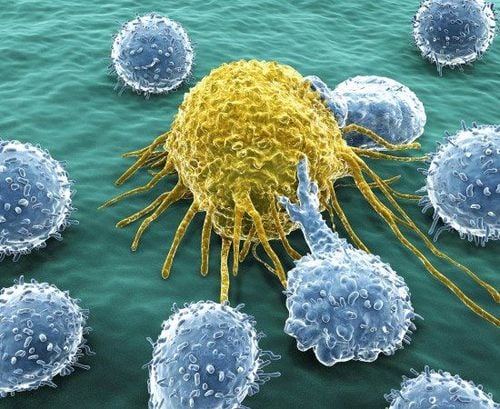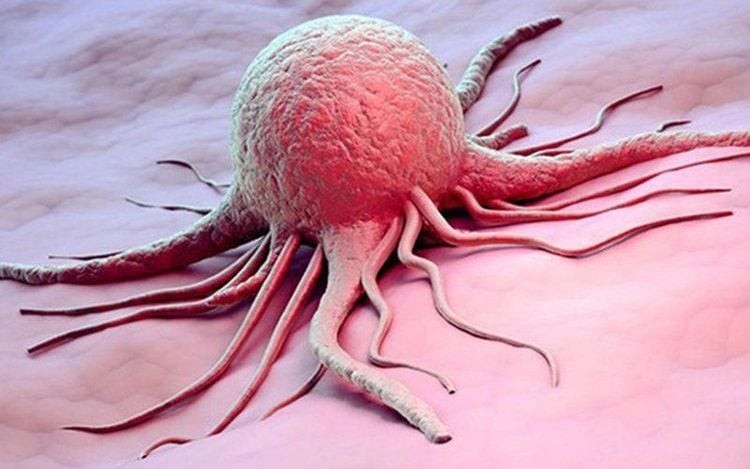This is an automatically translated article.
The article was translated and synthesized by Dr. Nguyen Hong Thanh - Research Specialist, VinmecStem Cell Research Institute and Gene Technology
Genes that control the body's immune system therefore play a very important role in controlling the growth of solid tumor cells. Changes in these genes can lead to a loss of control of the immune system, creating conditions for tumor growth.
During growth, tumor cells form a mechanism to evade the immune system by altering immune cells in their favor.
The understanding of the relationship between the frequency of occurrence of genetic changes and survival in patients with solid cancer is still very limited and has not been studied in large numbers of patients with solid cancer.
A team of Italian, British and Swiss scientists performed a meta-analysis study on a large number of genomic data of specific cancer cases on immune-related genes. A list of 770 genes (PanCancer IO 360) was enumerated and included in the analysis.
Analyzes performed with nine types of solid tumors in a large group of cancer patients have shown that genetic changes in the studied genes are associated with reduced survival.
Tumor cells have successfully evaded the immune system by interfering with immunosuppressive cells (immunosuppressive cells) through immune signals, thereby controlling immune invasion, creating conditions for tumor cell proliferation.

Current immunotherapy drugs can interfere with immune cells in the tumor microenvironment to facilitate tumor control. Targeted therapies targeting the PD-L1 and PD-1 receptors have shown positive results in PD-L1 receptor-positive patients.
Immune responses leading to tumor cell destruction by stimulating an immune response may function normally and patients can induce a rapid and sustained immune response to PD-L1 and its suppression PD-1 mechanism.
A meta-analysis of 4174 patients with advanced or metastatic cancer found that the efficacy of PD-1 and PD-L1 inhibitors in PD-L1-positive patients was significantly different ( p = 0.02) compared with PD-L1-negative patients.
In fact, PD-L1-positive patients had significantly longer survival (n = 2254, HR 0.66, 95% CI: 0.59–0.74) compared with patients negative for PD-L1 (1920, 0.80, 0.71 to 0.90). However, a small number of PD-L1-negative tumors respond to PD-L1 or PD-1 monotherapy.
It is important to note that PD-L1 receptor expression is not always a predictor of PD-1 or PD-L1 inhibitor efficacy. The correlation between PD-L1 expression and the outcome of inhibitory therapy is still a matter of debate. This could be because many factors can affect the reliability of quantifying the effectiveness of therapy such as: heterogeneity in immunohistochemical staining, mainly due to multiple antibodies and clones. different affinity and properties for drug molecules; different staining systems and methods; Tumor heterogeneity itself can cause large variations in gene expression (GEP).

Besides the urgent need for an international standard method to analyze PD-L1 expression, more reliable biomarkers of response to immunotherapies are also needed.
Furthermore, immune checkpoint inhibitors are only one part of the search and development of targeted therapies based on harnessing the immune system to fight cancer. Many other targets are also being studied to create new drugs that modulate the immune system, with drug combinations able to induce a better immune response than single drugs. For example, combining CTLA-4-targeted therapy (ipilimumab) with a PD-1-targeted inhibitor (nivolumab), may enhance immune activity in patients compared with either therapy. Anti-CTLA4 can lead to enhanced priming and activation of antigen-specific T cells as well as regulatory T cells capable of deletion from the tumor microenvironment. CTLA4-targeted therapy supports the immune system to recognize cancer cells in PD-L1-negative patients. This demonstrates that there are additional molecular pathways or mechanisms for the normal functioning of the immune system against cancer.
Besides immune checkpoint inhibitors (monoclonal antibodies), other therapies are also used in cancer treatment such as: nonspecific immunotherapy (interferon and interleukin); oncolytic virus treatment; T cell therapy (CAR-T); T-cell receptor therapy; tumor-infiltrating lymphocyte therapy; dual specific monoclonal antibody. These therapies are designed to target more than one different epithelium at the same time, in order to trigger an immune response against the cancer.

Some other therapies such as cancer vaccines; colony-stimulating factors, which strengthen the immune system by promoting the production of white blood cells in the bone marrow; drugs like imiquimod, lenalidomide, thalidomide, and pomalidomide help kickstart the immune system against certain solid tumors.
Personalized medicine plays an increasingly important role in cancer diagnosis, prognosis and treatment. The recent introduction of various drugs into routine clinical practice has positively changed the landscape of cancer treatment. Multiple clinical trials are currently underway to evaluate the synergistic effects of multiple immune checkpoint inhibitors and targeted therapies on pathogenic mutations with promising initial results.
The essence of precision medicine is “Delivering a personalized therapy” through patient genetics and “Specialty drugs”. Clinical oncology is entering an era of precision medicine when treatment decisions are based on targeting the molecular abnormalities of the tumor in order to select the right patients for a new or more targeted drug. suitable for targeted therapy in combination with chemotherapy, hormone therapy or radiation therapy.
Please dial HOTLINE for more information or register for an appointment HERE. Download MyVinmec app to make appointments faster and to manage your bookings easily.
Articles source: futuremedicine.comAuthors: Navid Sobhani, Silvia P Corona, Giandomenico Roviello, Stefan Bagby, Alberto D'Angelo, Giandomenico Lezzi and Danielle Generali. Future Medicine, May 2020














